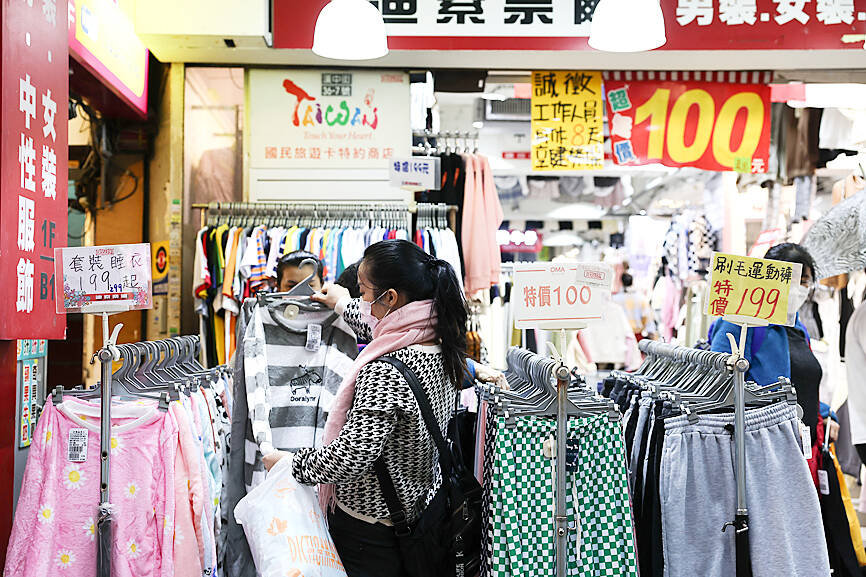People are less optimistic about receiving pay raises next year, a survey released yesterday by Cathay Financial Holding Co (國泰金控) showed.
Fifty-nine percent of respondents said they expected their salaries to remain unchanged next year, while a similar Cathay Financial survey conducted last year showed that 49.5 percent of respondents expected no changes in their salaries this year.
This year’s survey showed that 33 percent of 19,052 respondents said they anticipated pay raises next year, lower than the 44 percent found in the previous survey.

Photo: CNA
Meanwhile, 8.8 percent said they expected wage cuts next year, up from 6.2 percent in the previous survey, Cathay Financial said, adding that 55 percent expected to receive one to three months’ salary as a year-end bonus.
The company attributed the downbeat sentiment to a weaker outlook for economic growth and employment next year, with the survey showing that 37 percent of respondents expected Taiwan’s labor market to worsen in the next six months, compared with 35.5 percent who predicted no changes in the market and 19 percent who expect the labor market to improve.
Forty percent said they expected the economy to deteriorate in the next six months, while 32 percent expect the economy to improve, Cathay Financial said.
Most respondents forecast GDP growth of 2.78 percent for next year, it added.
Nevertheless, confidence in the market appears to have improved.
The survey showed that 34 percent said they expected local stocks to rise over the next six months, higher than the 25 percent in another survey last month, while 25 percent said that they would reallocate their assets to add more shares to their investment portfolios, up from 20.6 percent a month earlier, Cathay Financial said.

TECH SECURITY: The deal assures that ‘some of the most sought-after technology on the planet’ returns to the US, US Secretary of Commerce Gina Raimondo said The administration of US President Joe Biden finalized its CHIPS Act incentive awards for Taiwan Semiconductor Manufacturing Co (TSMC, 台積電), marking a major milestone for a program meant to bring semiconductor production back to US soil. TSMC would get US$6.6 billion in grants as part of the contract, the US Department of Commerce said in a statement yesterday. Though the amount was disclosed earlier this year as part of a preliminary agreement, the deal is now legally binding — making it the first major CHIPS Act award to reach this stage. The chipmaker, which is also taking up to US$5 billion

CHANGING JAPAN: Nvidia-powered AI services over cellular networks ‘will result in an artificial intelligence grid that runs across Japan,’ Nvidia’s Jensen Huang said Softbank Group Corp would be the first to build a supercomputer with chips using Nvidia Corp’s new Blackwell design, a demonstration of the Japanese company’s ambitions to catch up on artificial intelligence (AI). The group’s telecom unit, Softbank Corp, plans to build Japan’s most powerful AI supercomputer to support local services, it said. That computer would be based on Nvidia’s DGX B200 product, which combines computer processors with so-called AI accelerator chips. A follow-up effort will feature Grace Blackwell, a more advanced version, the company said. The announcement indicates that Softbank Group, which until early 2019 owned 4.9 percent of Nvidia, has secured a

TRADE WAR: Tariffs should also apply to any goods that pass through the new Beijing-funded port in Chancay, Peru, an adviser to US president-elect Donald Trump said A veteran adviser to US president-elect Donald Trump is proposing that the 60 percent tariffs that Trump vowed to impose on Chinese goods also apply to goods from any country that pass through a new port that Beijing has built in Peru. The duties should apply to goods from China or countries in South America that pass through the new deep-water port Chancay, a town 60km north of Lima, said Mauricio Claver-Carone, an adviser to the Trump transition team who served as senior director for the western hemisphere on the White House National Security Council in his first administration. “Any product going

CARBON REDUCTION: ‘As a global leader in semiconductor manufacturing, we recognize our mission in environmental protection,’ TSMC executive Y.P. Chyn said Taiwan Semiconductor Manufacturing Co (TSMC, 台積電), the world’s biggest contract chipmaker, yesterday launched its first zero-waste center in Taichung to repurpose major manufacturing waste, which translates into savings of NT$1.5 billion (US$46 million) in environmental costs a year. The environmental cost savings include a carbon reduction benefit of 40,000 tonnes, equivalent to the carbon offset of over 110 Daan Forest Parks, the chipmaker said. The Taichung Zero Waste Manufacturing Center is part of the chipmaker’s greater efforts to reach its net zero emissions goal in 2050, aligning with the UN’s 12th Sustainable Development Goal. The center could reduce TSMC’s outsourced waste processing